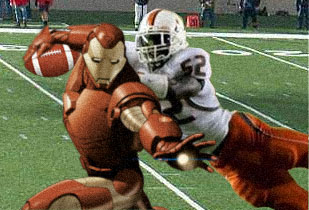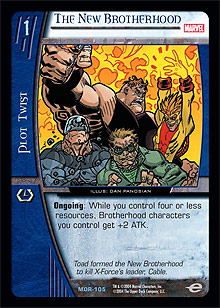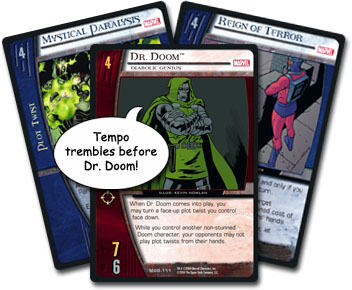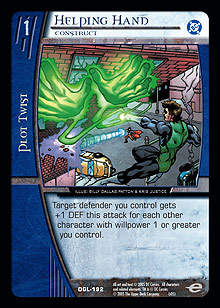
This week, I watched my first game of American football in a number of years. I am one of the six or seven people in England that actually enjoy watching this sport, in spite of the fact that the entirety of the USA seems intent on calling it football when the rest of the world recognizes that football is played with a round ball, two goals, and rather more modestly sized teams.
There are various pluralities about the NFL that have always rather struck a chord with me: The way that games can be about spectacular individual plays or careful wars of attrition; the fact that it is a game of teams in which individuals regularly shine; the way that the team is split such that each player is very much a specialist in his field. If there were a single thing about the sport that I could identify as the reason that I lightheartedly stay up until 4am to watch it live, though, it would be that the game is all about the application of pressure.
 The defense in American football constantly looks to put pressure on the opposing team’s offense. Quarterbacks have a small window of opportunity in which to make the big pass. Receivers always have a player on them hampering their ability to make a crucial catch. Even the rules of the game ensure that the team on offense is constantly forced to push forward or lose the privilege of possession. When one factors in the clock, the score-line at any point of a game, and the importance of individual games within the context of a league system, there is always a massive weight on the shoulders of every player. No wonder they need the shoulder pads.
The defense in American football constantly looks to put pressure on the opposing team’s offense. Quarterbacks have a small window of opportunity in which to make the big pass. Receivers always have a player on them hampering their ability to make a crucial catch. Even the rules of the game ensure that the team on offense is constantly forced to push forward or lose the privilege of possession. When one factors in the clock, the score-line at any point of a game, and the importance of individual games within the context of a league system, there is always a massive weight on the shoulders of every player. No wonder they need the shoulder pads.
The winners in American football will typically be the ones that can work through the pressure while applying it to their opponents. Every game is a battle, and every battle part of a war. Planning is obviously very important, but it is the execution of plans that gets people jumping up and down on Sunday afternoons and Monday nights.
So, how does this all translate across to Vs. System? I don’t think I can get away with spending an entire week without mentioning the game of battling superheroes. Each week I try, and each week I buckle under the pressure after my little intro section. And therein, I think, lies my link. Pressure is everywhere, and if you can successfully apply it and deal with it when it is applied to you, you will likely do very well.
Pressure can be applied in two ways in Vs. System—through the game state and through the demeanor of the players.
NOTA BENE! (That is Latin for “note well.” Please do so.)
Vs. System is a game. Games are supposed to be fun. I know that I sometimes get caught up in being competitive, but I’m always looking to have a good time, and never at the expense of others. Don’t take this article as carte blanche to start pressuring players in a way that stops the game from being fun. Mind games are still games, and your opponent should never feel belittled or threatened. That is just plain unsportsmanlike conduct, which ultimately lowers your chances of winning, because it could get you game losses.
On Board Pressure
The immediately obvious form of pressure comes from having a controlling game position. If you look across to your opponent’s side of the board and it is full of concerning characters, then you might find yourself forced to consider each of your decisions with a more critical eye. This is one of the strengths of playing a well-known net deck. Your opponents will have a good idea of the trouble that they’re in after a strong early game from a net deck, which won’t always be the case with more unusual creations. Unexpected threats are definitely of concern, especially to opponents who feel that they've tested the format enough to know what's going on but then find themselves suddenly unmanned. But if you are looking to apply raw pressure, unknown decks aren’t typically the greatest.*
 In terms of really leaning on opponents, though, there is no better way to make them aware of their potential to lose than to get and stay ahead on endurance totals. Nobody likes playing against The New Brotherhood, because there's a potential for endurance totals to dwindle into nothingness regardless of what you do. At a $10K, I played a game against a Fantastic Four beatdown deck that went massively aggressive with its plot twists in the early game and put me down to a disconcertingly low endurance total. There’s no better way to rattle opponents into worrying about combat pumps than to show them that you’re running lots of them and are not afraid to use them!
In terms of really leaning on opponents, though, there is no better way to make them aware of their potential to lose than to get and stay ahead on endurance totals. Nobody likes playing against The New Brotherhood, because there's a potential for endurance totals to dwindle into nothingness regardless of what you do. At a $10K, I played a game against a Fantastic Four beatdown deck that went massively aggressive with its plot twists in the early game and put me down to a disconcertingly low endurance total. There’s no better way to rattle opponents into worrying about combat pumps than to show them that you’re running lots of them and are not afraid to use them!
In many respects, the reason that Control decks are hard to play has nothing to do with being able to use search effects properly or playing stalling plot twists at the right time. It is, in fact, all about being able to effectively concede the early game and accept being behind on endurance in the knowledge that you can mete back the damage later with interest.
If I were looking for a deck that’s great at applying on-board pressure in the aggressive sense, I would likely go to The New Brotherhood or some riff on the concealed deck from $10K Atlanta played by Pro Circuit Indianapolis winner David Leader. With its huge numbers of ATK pumps and very focused theme, it can be pretty daunting to play against.
 There is defensive pressure also, though it is less straightforward to pin down. Any time you feel that your opponent has complete control of the game, you will likely be under a little more stress than normal, and it’s possible that no endurance lead will be enough to mitigate it. Your friend and mine, Dr. Doom, Diabolic Genius, is quite hot at making opponents’ lives a little trickier. And between him, Latverian Embassy, Mystical Paralysis, and Reign of Terror, it’s quite easy to feel that it no longer matters how good your offense is, as your chances of winning are hampered by someone who is no doubt laughing at you from behind his iron mask.
There is defensive pressure also, though it is less straightforward to pin down. Any time you feel that your opponent has complete control of the game, you will likely be under a little more stress than normal, and it’s possible that no endurance lead will be enough to mitigate it. Your friend and mine, Dr. Doom, Diabolic Genius, is quite hot at making opponents’ lives a little trickier. And between him, Latverian Embassy, Mystical Paralysis, and Reign of Terror, it’s quite easy to feel that it no longer matters how good your offense is, as your chances of winning are hampered by someone who is no doubt laughing at you from behind his iron mask.
The Mental Game
It has been said that actions speak louder than words. While this tends to be true, I’m rather a fan of backing actions up with words and vice versa. One cannot always rely on opponents recognizing when they are under pressure, and the appropriate demeanor or phrase here and there can often make the difference between winning and losing.
Much on-board pressure can be relegated to the sidelines in Vs. as a natural tactic, given that if people feel pressure, it tends to be justified. If you are behind on endurance in a big way, it’s only natural to feel that the game might be slipping away. It may well be. It would be redundant of me to suggest that the best way to win is to win.
With appropriate psychological ploys, though, it is easy to suggest to opponents that the position they are in is different from how it may initially appear. The power of suggestion is a wonderful thing. Imagine that you had an aggressive start but are rapidly running out of steam with which to finish things off. All you need is time. If your opponent realizes the position you’re in, it would not be particularly tough for him or her to eliminate your early advantage without recourse. However, Vs. is a game of imperfect information. If you can, through some combination of body language and spoken word, imply that you have plenty of additional pressure, you may sway people into making decisions that ultimately harm their chances of winning.
My personal favorite is to do a little bit of visual math. If you check your opponent’s endurance totals a few times, then start doing some complicated math on a piece of paper (or even just point at things and mutter to yourself), it is not unreasonable for your opponent to come to the conclusion that you’re working out whether or not you’re in range for a kill. If your opponent plays around that, brilliant—you may just have earned yourself the time you need to get the win. One of the best things about this particular bluff is that one can make it very hard to call just by doing more visual math, even when you genuinely are about to kill someone. As long as you aren’t slowing down the pace of the game to a point where it’s a problem, this can be a very powerful technique.
 Another nifty technique that I rather like is verbal fishing. Imagine that I’m playing a GLEE mirror and am concerned that my attacks might be thwarted by a Helping Hand. If I know that Helping Hand is going to be an issue in the matchup, I will start fishing for it early. It’s surprising how often just asking people if they have a plot twist at a time that’s not the worst for you can work in your favor. They will either play it early or just glance at it enough to let you know for sure that it’s there for later. Once you’re pretty sure you have a good read on plot twists in opponents’ hands, you can really pile on the pressure by letting them know about it. Talk your way through a turn, pointing out how you’re playing around the Helping Hand in your opponent’s hand by attacking in the correct order, and then have a look at your opponent’s reaction. I guarantee this is a lot of fun.
Another nifty technique that I rather like is verbal fishing. Imagine that I’m playing a GLEE mirror and am concerned that my attacks might be thwarted by a Helping Hand. If I know that Helping Hand is going to be an issue in the matchup, I will start fishing for it early. It’s surprising how often just asking people if they have a plot twist at a time that’s not the worst for you can work in your favor. They will either play it early or just glance at it enough to let you know for sure that it’s there for later. Once you’re pretty sure you have a good read on plot twists in opponents’ hands, you can really pile on the pressure by letting them know about it. Talk your way through a turn, pointing out how you’re playing around the Helping Hand in your opponent’s hand by attacking in the correct order, and then have a look at your opponent’s reaction. I guarantee this is a lot of fun.
Getting good reads can be a tricky business and is one of the areas where practice comes into play in a big way. If you are familiar with popular lists for good decks and have tested them a fair bit, you will know what the important cards are in a matchup and when to worry about them. Once you are familiar enough with the matchup to be able to play it straight, you can start thinking about mixing things up a little with psychological ploys.
Another fun way to cause opponents to question their decisions comes whenever they play an effect with a few potential targets. A little remark of “interesting” in response to a choice of which character to return with Dr. Light, Master of Holograms, or a quick move to KO one character when an opponent plays Finishing Move and has not yet declared a target, can cause an opponent to question his or her knowledge of a matchup. The more you give your opponents to think about, the greater your chances of helping them to miss something important.
Deft use of body language and psychological ploys can add a lot to the quality of your game and the amount of fun that you have playing it, but it comes with a warning. As I remarked earlier, it can make players feel uncomfortable beyond the game state. This has no business in the game. You should never have to misrepresent, rules lawyer, stall, or be unsportsmanlike to have a strong mental game. If you start to slip into this area, sooner or later you will receive warnings for it, and as a judge I will without qualms hand out game losses if I feel that a player is going beyond what the rules of the game (and common decency) denote to be fair play.
The easiest defense against players whose mental game is powerful is practice. If you feel that you’re receiving undue distractions from an opponent, or that an opponent has crossed over to the dark side of misrepresentation or intimidation, politely inform him or her of your feelings and call a judge if necessary. Of course, my favorite technique when faced with another bluffer is to bluff right back. That is where the fun really begins.
Have fun and be lucky,
Tim “Mental Gamer” Willoughby
timwilloughby@hotmail.com
* Personally, my favorite rogue decks are the ones that rather undersell themselves until they get around to actually winning. If you can’t put your opponent into a position where he or she might make errors due to pressure, then you want to put your opponent into a position where he or she makes decisions based on faulty or incomplete information.